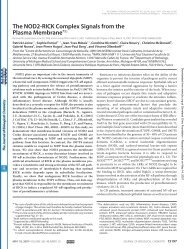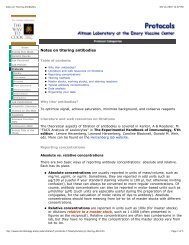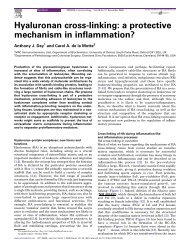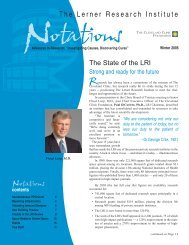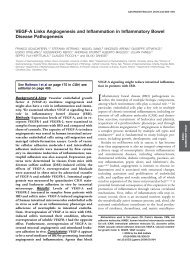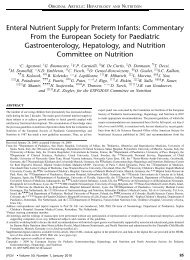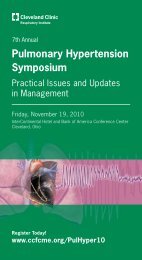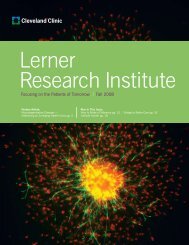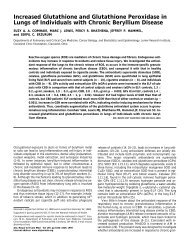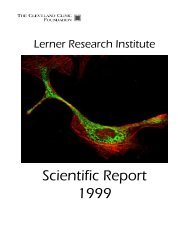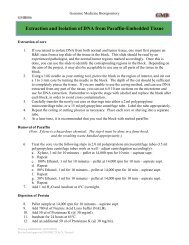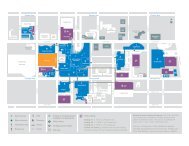Scientific Report 2003-2004 - Cleveland Clinic Lerner Research ...
Scientific Report 2003-2004 - Cleveland Clinic Lerner Research ...
Scientific Report 2003-2004 - Cleveland Clinic Lerner Research ...
- No tags were found...
You also want an ePaper? Increase the reach of your titles
YUMPU automatically turns print PDFs into web optimized ePapers that Google loves.
Center forUrological <strong>Research</strong>The Center for Urological <strong>Research</strong> comprisesbasic and clinical research laboratories withinthe <strong>Lerner</strong> <strong>Research</strong> Institute and theGlickman Urological Institute. Each of theselaboratories is directed by a full-time scientistfaculty member jointly appointed in a basic sciencedepartment of the <strong>Lerner</strong> <strong>Research</strong> Institute and theGlickman Urological Institute. Basic research studieswithin the Center for Urological <strong>Research</strong> arepredominantly focused in the areas of transplantationbiology, renal epithelial cell biology, urologiconcology and bladder physiology. Renal cellcarcinoma and prostate cancer are the two urologicmalignancies that are being extensively studied. Theemphasis within the Center for Urological <strong>Research</strong>is on translational research studies that can enhanceour understanding of the pathogenesis, presentationand management of urologic diseases. All urologyresidents spend a full year training in one of theseresearch laboratories; the period of research trainingfor postgraduate urology fellows is two or threeyears. Members of the Center meet regularly duringmonthly research presentations. In addition, theresidents and fellows present their work during theannual Urology <strong>Research</strong> Day which includes twodayvisits by prominent Visiting Professors fromother institutions.Andrology Laboratory and Sperm Bank, andCenter for Advanced <strong>Research</strong> in HumanReproduction, Infertility, and SexualFunction<strong>Research</strong> work in the Reproductive <strong>Research</strong>Center is mainly focused on elucidating themolecular mechanism associated with male andfemale infertility, and on studies involving themanagement of sexual dysfunction in male andfemale patients following urologic surgeries.Bladder Pathophysiology LaboratoryThis lab focuses on projects related tobladder and female pelvic floor disorders. Anumber of translational projects currentlyinvestigate the bladder remodeling under diabeticconditions in both animal models and humanbladder samples. These projects serve as model forstudies of other pathologies involving the bladdersuch as changes occurring with geriatric bladder.Recently an animal model for stress urinaryincontinence and sling procedure has been created.Validation and testing of this model for a numberof research questions related to treatment of stressurinary incontinence is under way.Renal Carcinoma Immunology LaboratoryThe overall goal of this laboratory researcheffort is to understand how renal tumors can inhibitthe development of an effective antitumor immuneresponse. Findings suggest that tumor derivedproducts can either sensitize T lymphocytes toactivation induced cell death or can directly induceapoptosis. The affected cells appear to includeantigen-specific T cells. The major projects includedefining the role tumor derived gangliosides andoxidized lipid products play in altering thesensitivity of T cells to apoptosis including theirmechanism of action. Additional studies areattempting to determine if the transgene expressionof various anti-apoptotic genes can protect T cellsfrom tumor-induced apoptosis.Transplant Immunology LaboratoryThe focus of this program is inflammatoryfactors directing T cells and other leukocytes intorenal allografts. Current projects are investigating: 1)the expression of inflammatory genes duringischemia and reperfusion of kidneys during clinicaltransplantation and in mouse models: 2) theexpression of inflammatory genes and proteins inurine as markers indicating the presence ofrejection in renal allografts; and, 3) the role ofadhesion molecules and chemokines in directingleukocyte infiltration into organ allografts.Transplant Immunology LaboratoryThis laboratory continues to focus attentionon transplantation immunobiology in mousemodels and translational studies of humanimmunology in transplant recipients. The animalstudies provided new and important information onthe role of memory T cells as barriers to transplanttolerance. They additionally identified a neweffector pathway for alloreactive T cells that wasrecently published in Nature Immunology. Humanstudies are progressing nicely as well. The grouprecently showed that posttransplant immunemonitoring of human peripheral blood is feasibleand that this approach may provide a reliablesurrogate marker for poor outcome lateposttransplant.Prostate Cancer LaboratoryThe laboratory’s research focus is onunderstanding the biology of abnormal prostategrowth. The laboratory cloned and has characterizeda novel protein that we named prostate specificmembrane antigen, PSMA. PSMA is overexpressedin prostate and increases in its expression in theaggressive forms of prostate cancer. We areidentifying the biological reasons for its expressionand are developing new methods to further targetPSMA for imaging prostate cancer and for targetingtherapy to prostate tumors. They discovered thatPSMA is strongly expressed in the new bloodvessels of all solid tumors. Thus PSMA is a targetnot only for prostate tumor cells, but a targettherapy development for all solid tumors.Epithelial Cell Biology LaboratoryUrology-related research in Dr. Weimbs’laboratory focuses on three themes. First, theinvestigation of the function of polycystin-1, theprotein affected in autosomal-dominant polycystickidney disease. Second, the identification of urinarymarkers for the detection of early-stage renal cellcarcinoma. Third, the investigation of basicmechanisms underlying the ability of renalepithelial cells perform “polarized membranetrafficking” which is essential to their function.CENTER FORUROLOGICAL RESEARCHINVESTIGATORSAshok Agarwal, Ph.D. 1,5Firouz Daneshgari, M.D. 1,6Robert L. Fairchild, Ph.D. 2,7James H. Finke, Ph.D. 2,8Peter Heeger, M.D. 2,7Warren Heston, Ph.D. 3,19Thomas Weimbs, Ph.D. 4,101Glickman Urological Institute2Department of Immunology3Department of Cancer Biology4Department of Cell Biology5Director, Andrology Laboratoryand Sperm Bank, andCenter for Advanced<strong>Research</strong> in HumanReproduction, Infertility, andSexual Function6Director, Bladder PathophysiologyLaboratory7Director, Transplant ImmunologyLaboratory7Director, Transplant ImmunologyLaboratory8Director, Renal CarcinomaImmunology Laboratory9Director, Prostate CancerLaboratory10Director, Epithelial CellBiology Laboratory177



